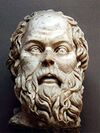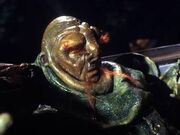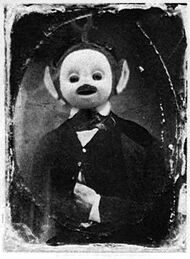UnPoetia:Main Page
roses are red, violets are violet,
rhyme schemes and meter are a pain in the ass, screw you |
Poetry is an art form in which language is used for its obfuscatory qualities in addition to, or instead of, meaningful and useful content. Poetry has a long history, and early attempts to define poetry, such as Aristotle's Poetics, focused on the various uses of speech in rhetoric, drama, song and charming the togas off of potential bed buddies. Contemporary poets, such as Dylan Thomas, often identify poetry not as a literary genre within a set of genres, but as noble way of remaining unemployed and virtually useless to society. Poetry often uses condensed forms and conventions to reinforce or expand the meaning of the underlying words or to invoke irrational or sensual experiences in the reader, as well as using devices such as assonance, alliteration and the rhythm method to achieve musical or incendiary effects.
|
|
Whose house this is I think I know. She works down in the village, though. She will not see me hiding here, To watch her give a private show. I know my wife would think it rank, To hear about this monkey spank, But in this joy I must partake. I still require my daily wank. She gives her ample breasts a shake, And in my pants I feel an ache, So to my lust I do succumb, And free the prisoned garter snake. I gaze upon her unclothed bum, And wish, dear Lord, I could have some, Oh Mrs. Woods you make me cum! Oh Mrs. Woods you make me cum!  An unretouched photo of Billy Shakespeare.
"There once was a brainy baboon, who always breathed down a bassoon, for he said, 'It appears, that in billions of years, I shall certainly hit on a tune.'"
Well, writing a poem or two would surely help... Make a new poem Too lazy? Search for someone else's work: |
Poetic justice is when justice is carried out with poetry. In court, for example, the defendant, plaintiff, justice, lawyers and jury all have to perform the whole trial in poetry or in rhyming prose. Blank verse is not permitted. This can be done at the defendant's request (and amusement). Or, if the justice hearing the trial wishes it, whether or not the defendant wants it. The best poetic justices and lawyers are Vogons as their poetry, even in judicial language, is the 33rd best poetry in the galaxy. Appeals are rare, as appellate court judges can rarely bear to read the transcripts. You see, the poetry judges are all Vogons, and a Vogon's idea of what is good poetry is unlike that of any other member of any other race in the multiverse. Frankly, almost none of this is true. But I'm not telling what. Edgar Allan Poe was an American writer (1809-1849) best known for his cheery visions of a utopian future, and colourful tattoos. His best known poem, The Raving, is about an excitable crowd of Britney Spears fans tapping on his chamber door, rapping on his chamber door, and occasionally crapping on his chamber floor. This crowd of lunatics repeatedly chant the word "Nevermore", on the Night's Plutonian shore. The half-sane narrator grieves over the loss of his Lenore™-brand cleaning detergent:
Although he is often believed to have been the source of the phrase "po-faced", derived from "Poe-faced", in fact this term comes from the Po River in Italy, which is shaped like a man's face.
|
| UnNews The news source on crack |
Uncyclopedia The content-free encyclopedia |
Undictionary The ick!tionary of all things best left unsaid | |||
| UnTunes Where noisy things can live and prosper |
Games Another way to waste time |
HowTo Instructions and guides for anything and everything | |||
| UnBooks Content-free books |
Unquotable Useless misquotes galore |
Uncycloversity If it makes sense, we don't want it | |||
| UnPoetia Poetry for people who hate poetry |
UnDebate Debating all the irrelevant issues |
UnScripts We can ruin stage and film too | |||
| Why? Don't make me explain it to you twice |
UnReviews We'll tell you why things suck |
UnBestiary Moo! Grrr! Narf! Harblesnock! | |||
| UnCommons Broken media repository |



